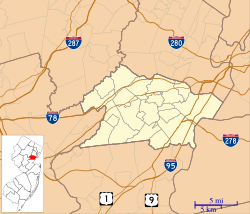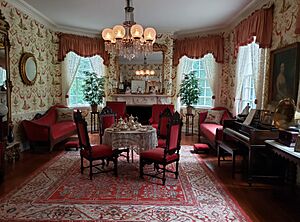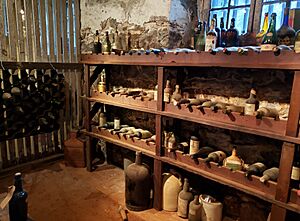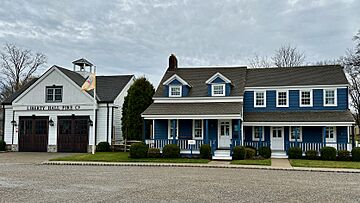Liberty Hall (New Jersey) facts for kids
|
Governor William Livingston House
|
|
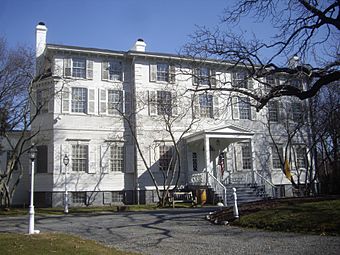 |
|
| Location | Morris and North Avenues, Union, New Jersey |
|---|---|
| Area | 140 acres (57 ha) |
| Built | 1772 |
| NRHP reference No. | 72000807 |
Quick facts for kids Significant dates |
|
| Added to NRHP | November 28, 1972 |
| Designated NHL | November 28, 1972 |
Liberty Hall, also known as the Governor William Livingston House, is a very old and important home in Union, Union County, New Jersey. Many famous and powerful people lived here or visited. Today, it is known as the Liberty Hall Museum.
This historic house started as a 14-room home in 1772. Over time, it grew into a huge 50-room mansion. It was once the home of William Livingston, who was the very first Governor of New Jersey. Other important people who lived here include United States Supreme Court Justice Henry Brockholst Livingston and members of the Kean family, who were also important in politics. Even Alexander Hamilton, who later became the first Secretary of the Treasury, lived here for a short time.
Many famous historical figures visited Liberty Hall. These guests included George Washington, Martha Washington, Marquis de Lafayette, and John Jay. John Jay, who became the first Chief Justice of the United States, even got married at Liberty Hall. The museum is now part of Kean University in Union, New Jersey.
Contents
History of Liberty Hall
The Livingston Family's Time
William Livingston, a lawyer, built Liberty Hall in 1772. He was a very important person in early American history. He helped create the United States and became the first Governor of New Jersey. In the first year the house was occupied, Alexander Hamilton lived with Livingston.
Livingston bought the land for the house in 1760. It was a large property, about 120 acres, near New York City. The Livingston family moved into Liberty Hall permanently in 1773. The beautiful gardens and orchards that Governor Livingston planted are still there today.
Many important guests came to Liberty Hall. These included George Washington and Martha Washington. One of Livingston's daughters even married John Jay at the house. During the American Revolutionary War, the house was damaged by both American and British soldiers. After the war, Livingston returned and lived there until he passed away in 1790. His son, Henry Brockholst Livingston, who later became a Supreme Court Justice, inherited the home.
The Kean Family's Time
In 1811, the Kean family bought Liberty Hall. Susan Livingston Kean, a niece of William Livingston, was the new owner. She changed the name of the house to Ursino. This name came from her second husband's family estate in Poland.
Later, Colonel Peter Kean and his wife, Sarah Sabina Morris, inherited the house. Their son, Colonel John Kean II, then lived at Liberty Hall for 60 years. He made the biggest changes to the house. He expanded it to 50 rooms to fit his large family. He also added modern things like running water and gas lighting.
The house then went to John Kean, who was a Congressman and Senator from New Jersey. He continued to live and host events at Liberty Hall. Finally, Captain John Kean inherited the house in 1932. He lived there with his wife, Mary Alice Barney. Mary Alice Kean was very interested in history. She worked to restore Liberty Hall and other historic homes. She was the last person to live in Liberty Hall before it became a museum.
How the House Was Built
The building has three main parts. It was built with a wooden frame over a stone basement. The original middle part had two stories and a special roof. It also had two chimneys. On each side, there were one-story wings with unique shapes and roofs. The outside walls were smooth, and the corners had special stone-like decorations.
Over the years, more parts were added. In 1789, a second story was added to the west side. In 1870, a third story was added to the west side and the middle part. The east side also got second and third stories. New rooms and a tower were built at the corners. A new roof with decorative brackets was also added to the whole building.
The front of the house still looks much like it did originally. Steps lead up to the front porch. The front door has a special fan-shaped window above it. The windows on the first floor have solid shutters, while the second-floor windows have slatted shutters. The third-story windows do not have shutters.
Inside, many of the original 18th-century rooms and their decorations are still there. Some parts of the house have been restored to look like they did a long time ago. Other parts were changed to add modern heating and plumbing for the different generations of the Kean family.
A National Treasure
In 1949, Mary Alice Kean started turning the house into a museum. In 1974, she brought back the name "Liberty Hall" for the house. Today, the museum is listed on the National Register of Historic Places. It is also a National Historic Landmark, which means it is very important to the history of the United States.
Liberty Hall is part of Kean University. It holds many collections of old furniture, clothes, letters, books, and pictures. These items tell the story of the people who lived there. Some special items include a letter signed by George Washington and an invitation to Abraham Lincoln's first inauguration. Liberty Hall is a key place for learning about American history.
See also
 | John T. Biggers |
 | Thomas Blackshear |
 | Mark Bradford |
 | Beverly Buchanan |


